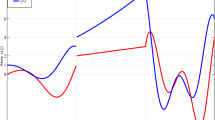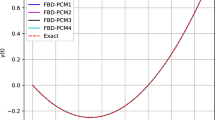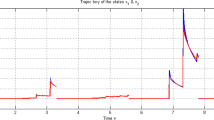Abstract
Accurate modeling of many dynamic systems leads to a set of Fractional Differential Equations (FDEs). This paper presents a general formulation and a solution scheme for a class of Fractional Optimal Control Problems (FOCPs) for those systems. The fractional derivative is described in the Riemann–Liouville sense. The performance index of a FOCP is considered as a function of both the state and the control variables, and the dynamic constraints are expressed by a set of FDEs. The Calculus of Variations, the Lagrange multiplier, and the formula for fractional integration by parts are used to obtain Euler–Lagrange equations for the FOCP. The formulation presented and the resulting equations are very similar to those that appear in the classical optimal control theory. Thus, the present formulation essentially extends the classical control theory to fractional dynamic system. The formulation is used to derive the control equations for a quadratic linear fractional control problem. An approach similar to a variational virtual work coupled with the Lagrange multiplier technique is presented to find the approximate numerical solution of the resulting equations. Numerical solutions for two fractional systems, a time-invariant and a time-varying, are presented to demonstrate the feasibility of the method. It is shown that (1) the solutions converge as the number of approximating terms increase, and (2) the solutions approach to classical solutions as the order of the fractional derivatives approach to 1. The formulation presented is simple and can be extended to other FOCPs. It is hoped that the simplicity of this formulation will initiate a new interest in the area of optimal control of fractional systems.
Similar content being viewed by others
References
Hestenes, M. R.,Calculus of Variations and Optimal Control Theory, Wiley, New York, 1966.
Bryson, Jr. A. E. and Ho, Y. C.,Applied Optimal Control: Optimization, Estimation, and Control, Blaisdell, Waltham, Massachusetts, 1975.
Sage, A. P. and White, III, C. C.,Optimum Systems Control, Prentice-Hall, Englewood Cliffs, New Jersey, 1977.
Bagley, R. L. and Calico, R. A.,‘Fractional order state equations for the control of viscoelastically damped structures’, Journal of Guidance, Control, and Dynamics14, 1991, 304–311.
Carpinteri, A. and Mainardi, F.,Fractals and Fractional Calculus in Continuum Mechanics, Springer-Verlag, Vienna, 1997.
Podlubny, I.,Fractional Differential Equations, Academic Press, New York, 1999.
Hilfer, R.,Applications of Fractional Calculus in Physics, World Scientific, River Edge, New Jersey, 2000.
Machado, J. A. T. (guest editor),‘Special issue on fractional calculus and applications’, Nonlinear Dynamics29, 2002, 1–386.
Miller, K. S. and Ross, B.,An Introduction to the Fractional Calculus and Fractional Differential Equations, Wiley, New York, 1993.
Samko, S. G., Kilbas, A. A., and Marichev, O. I.,Fractional Integrals and Derivatives – Theory and Applications, Gordon and Breach, Longhorne, Pennsylvania, 1993.
Oldham, K. B. and Spanier, J.,The Fractional Calculus, Academic Press, New York, 1974.
Gorenflo, R. and Mainardi, F.,‘Fractional calculus: Integral and differential equations of fractional order’, in Fractals and Fractional Calculus in Continuum Mechanics, A. Carpinteri and F. Mainardi (eds), Springer-Verlag, Vienna, 1997, pp. 291–348.
Mainardi, F.,‘Fractional calculus: Some basic problems in continuum and statistical mechanics’, in Fractals and Fractional Calculus in Continuum Mechanics, A. Carpinteri and F. Mainardi (eds), Springer-Verlag, Vienna, 1997, pp. 291–348.
Rossikhin, Y. A. and Shitikova, M. V.,‘Applications of fractional calculus to dynamic problems of linear and nonlinear hereditary mechanics of solids’, Applied Mechanics Reviews50, 1997, 15–67.
Manabe, S.,‘Early development of fractional order control’, DETC2003/VIB-48370, in Proceedings of DETC–03, ASME 2003 Design Engineering Technical Conference, Chicago, Illinois, September 2–6, 2003.
Bode, H. W.,Network Analysis and Feedback Amplifier Design, Van Nostrand, New York, 1945.
Manabe, S.,‘The non-integer integral and its application to control’, Japanese Institute of Electrical Engineers80, 1960, 589–597.
Skaar, S. B., Michel, A. N., and Miller, R. K.,‘Stability of viscoelastic control systems’, IEEE Transactions on Automatic Control33, 1988, 348–357.
Axtell, M. and Bise, M. E.,‘Fractional calculus applications in control systems’, IEEE Proceedings of the National Aerospace and Electronics Conference, Dayton, OH, USA, May 21–25, 1990, pp. 563–566.
Makroglou, A., Miller, R. K., and Skaar, S.,Computational results for a feedback control for a rotating viscoelastic beam’, Journal of Guidance, Control, and Dynamics17, 1994, 84–90.
Mbodje, B. and Montseny, G.,‘Boundary fractional derivative control of the wave equation’, IEEE Transactions on Automatic Control40, 1995, 378–382.
Machado, J. A. T.,‘Analysis and design of fractional-order digital control systems’, Systems Analysis Modelling Simulation27, 1997, 107–122.
Machado, J. A. T.,‘Fractional-order derivative approximations in discrete-time control systems’, Systems Analysis Modelling Simulation34, 1999, 419–434.
Podlubny, I., Dorcak, L., and Kostial, I.,‘On fractional derivatives, fractional-order dynamic systems and PIλDμ-controllers’, in Proceedings of the 1997 36th IEEE Conference on Decision and Control, Part 5, San Diego, California, December 10–12, 1997, pp. 4985–4990.
Oustaloup, A., Levron, F., Mathieu, B., and Nanot, F. M.,‘Frequency-band complex noninteger differentiator: characterization and synthesis’, IEEE Transactions on Circuits and Systems – Fundamental Theory and Applications40, 2000, 25–39.
Sabatier, J., Oustaloup, A., Iturricha, A. G., and Lanusse, P.,‘CRONE control: principles and extension to time-variant plants with asymptotically constant coefficients’, Nonlinear Dynamics29, 2002, 363–385.
Hotzel, R.,‘Some stability conditions for fractional delay systems’, Journal of Mathematical Systems, Estimation, and Control8, 1998, 499–502.
Hartley, T. and Lorenzo, C. F.,‘Dynamics and control of initialized fractional-order systems’, Nonlinear Dynamics29, 2002, 201–233.
Riewe, F.,‘Nonconservative {Lagrangian and Hamiltonian mechanics}’, Physical Review E53, 1996, 1890–1899.
Riewe, F.,‘Mechanics with fractional derivatives’, Physical Review E55, 1997, 3582–3592.
Agrawal, O. P.,‘Formulation of Euler-Lagrange equations for fractional variational problems’, Mathematical Analysis and Applications272, 2002, 368–379.
Agrawal, O. P.,‘General formulation for the numerical solution of optimal control problems’, International Journal of Control50, 1989, 627–638.
Lorenzo, C. F. and Hartley, T. T.,‘Initialized fractional calculus’, International Journal of Applied Mathematics3, 2000, 249–265.
Deithelm, K., Ford, N. J., and Freed, A. D.,‘A predictor-corrector approach for the numerical solution of fractional differential equations’, Nonlinear Dynamics29, 2002, 3–22.
Butzer, P. L. and Westphal, U,‘An introduction to fractional calculus’, in Applications of Fractional Calculus in Physics, R. Hilfer (ed), World Scientific, New Jersey, 2000, pp. 1–85.
Agrawal, O. P. and Saigal, S.,‘A novel, computationally efficient approach for hamilton–s law of varying action’, International Journal of Mechanical Sciences29, 1987, 285–292.
Author information
Authors and Affiliations
Corresponding author
Rights and permissions
About this article
Cite this article
Agrawal, O. A General Formulation and Solution Scheme for Fractional Optimal Control Problems. Nonlinear Dyn 38, 323–337 (2004). https://doi.org/10.1007/s11071-004-3764-6
Received:
Accepted:
Issue Date:
DOI: https://doi.org/10.1007/s11071-004-3764-6




